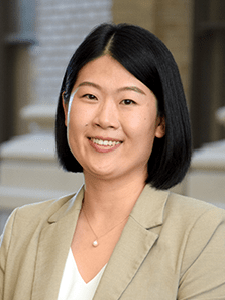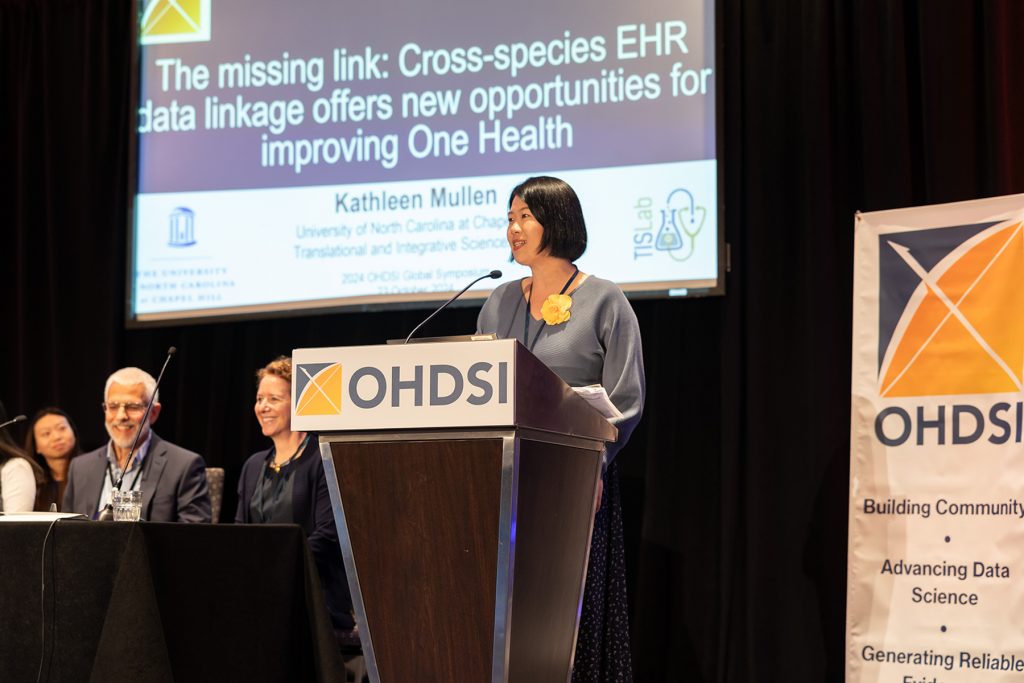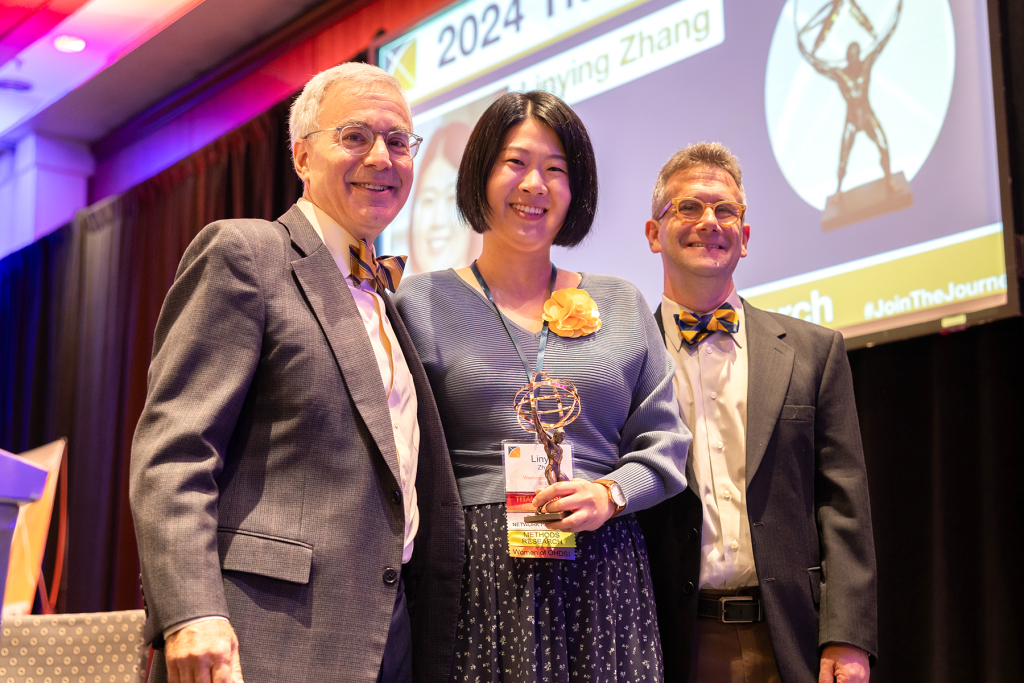- Who We Are
- Updates & News
- Standards
- Software Tools
- Network Studies
- Community Forums
- Education
- New To OHDSI?
- Community Calls
- Past Events
- Workgroups
- 2024 ‘Our Journey’ Annual Report
- Current OHDSI Events
- Support & Sponsorship
- CBER Best Seminars
- 2024 Global Symposium
- Guideline Opportunities
- Github
- YouTube
- Newsletters
Collaborator Spotlight: Linying Zhang
Linying Zhang is an assistant professor of biostatistics at the Institute for Informatics, Data Science, & Biostatistics at Washington University School of Medicine in St. Louis. Her research integrates causal modeling and machine learning for more reliable real-world evidence generation and building responsible AI algorithms in health care. She is the principal investigator of the CausAI Lab. She received her PhD in Biomedical Informatics from Columbia University, MS in Computational Biology from Harvard University, and BA from Boston University.
Linying earned the 2024 Edward H. Shortliffe Doctoral Dissertation Award Honorable Mention for her doctoral dissertation titled “Causal machine earning for reliable real-world evidence generation in healthcare” at the AMIA Symposium. She also earned the 2024 Titan Award for Methodological Research.
In the latest edition of the Collaborator Spotlight, Linying discusses OHDSI impact in her PhD journey, the critical need for methods research innovations, bringing Washington University into the OHDSI Evidence Network and … worm composting.

Can you discuss your background and career journey?
I started my academic journey with a Bachelor’s degree in Biochemistry and Molecular Biology from Boston University, followed by a Master’s degree in Computational Biology and Quantitative Genetics from Harvard University, and a PhD in Biomedical Informatics from Columbia University. I’m now an assistant professor at Washington University in St. Louis. Throughout my academic journey, I’ve been deeply interested in leveraging data science and machine learning to improve health care and patient outcome. My research focuses on integrating causal inference with machine learning to generate reliable real-world evidence from observational healthcare data, with applications ranging from drug safety to health disparities.
 Your PhD dissertation — Causal machine learning for reliable real-world evidence generation in healthcare — focused on improving both the reliability and equitability of observational research and earned one of the top AMIA honors. Can you discuss a couple of the key takeaways from your research?
Your PhD dissertation — Causal machine learning for reliable real-world evidence generation in healthcare — focused on improving both the reliability and equitability of observational research and earned one of the top AMIA honors. Can you discuss a couple of the key takeaways from your research?
My PhD dissertation focused on developing methods to enhance the reliability of real-world evidence generation from electronic health records (EHRs). One key takeaway was the critical importance of creating systematic, transparent, and open-source solutions to address the biases that can affect observational studies.
A significant challenge in such studies is the inconsistent adjustment for confounders, as the true confounding structure in medicine is rarely known. This inconsistency can lead to some confounders not being accounted for in a given study, making the drug effect estimate vulnerable to unmeasured confounding bias. My research demonstrated that the large-scale propensity score (LSPS) approach, developed within OHDSI, offers a systematic confounding adjustment solution by including all pre-treatment covariates in the analytical workflow. This comprehensive inclusion not only effectively accounts for bias from measured confounders but also makes the method more resilient to the effects of unmeasured confounding. By advancing and validating such methods, my work highlights the need of systematic confounding adjustment approaches for generating reliable real-world evidence.
You trained under George Hripcsak at Columbia and have been a steady collaborator in the community for years. Can you discuss the impact that OHDSI had during your PhD journey?
OHDSI has profoundly shaped my research vision and motivated me to address real-world health problems through method innovation. OHDSI’s commitment to reliable real-world evidence has directly inspired my work to develop methods that further enhance the reliability of real-world evidence. OHDSI also provides invaluable tools and resources, from The Book of OHDSI to open-source packages like HADES, that enable me to accelerate my research and tackle a broader range of questions with greater efficiency.
What stands out most, however, is OHDSI’s open-science philosophy and its global community. This unique culture fosters interdisciplinary and international collaboration, allowing me to address complex healthcare questions at a scale that would have been unimaginable otherwise. Through OHDSI, I’ve experienced the joy of collaborative science and the power of shared knowledge to drive meaningful innovation.
 What did winning the 2024 Titan Award for Methodological Research mean to you?
What did winning the 2024 Titan Award for Methodological Research mean to you?
Winning the Titan Award was an incredible honor and a humbling experience. I sincerely appreciate the recognition of my efforts in advancing methodological research for real-world evidence generation. This award also inspires a deeper sense of responsibility to continue driving innovation in methodological research and collaborating with others to push the boundaries of what we can achieve as a community.
Can you explain why constant innovation around methods research is critical for the community, and can you highlight something recently that has been an important development for the community?
Constant innovation in methods research is essential because healthcare and data landscapes are rapidly evolving. With the increasing availability of real-world data, we must continually refine our methods to address new challenges, such as causal inference across federated datasets, and confounding adjustment across heterogeneous datasets. We must adapt and refine our analytical approaches to address these complexities.
One recent development I find particularly exciting is the progress in addressing small sample size issues within federated data networks like OHDSI. In a federated network, data partners often manage databases of varying scales, and small sample sizes at certain sites can pose significant methodological challenges. Innovations in adapting analytical methods and diagnostics to work effectively in these smaller datasets represent a significant step forward. This progress enhances our ability to generate robust and reliable evidence, regardless of the scale of individual data sources, and strengthens the overall value of federated data network.
You recently started helping Washington University in St. Louis join the OHDSI Evidence Network. You are relatively new in your role as an assistant professor there, so what were the early challenges to bringing OHDSI to this role, and how rewarding has it been to see early success?
One of the early challenges was building awareness about OHDSI’s potential among faculty and institutional leadership. Bridging technical gaps, such as aligning local data structures with the OMOP Common Data Model, also required significant effort.
Despite these challenges, the journey has been incredibly rewarding. We’ve made great progress in standardizing our data into OMOP CDM and participating in network studies. Seeing the enthusiasm from colleagues and trainees as they engage with OHDSI has been particularly gratifying.
What are some of your hobbies, and what is one interesting thing that most community members might not know about you?
Outside of work, I enjoy skiing, dancing, and gardening. Speaking of gardening, I’ve been worm composting for about three years. These wriggly little coworkers have helped me turn scraps into gold for my garden. Feeding a family of thousands of worms is another large-scale project I work on that doesn’t involve analytics…yet. Who knows, maybe one day I’ll develop a predictive analytic to optimize the cardboard-to-kitchen-scrap ratio for optimal worm happiness.
